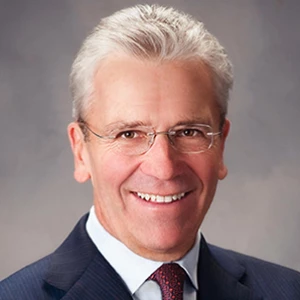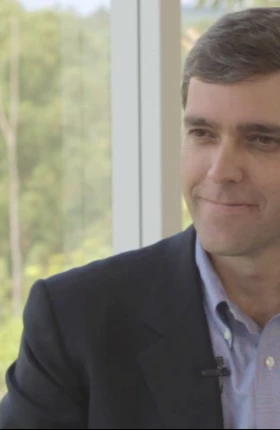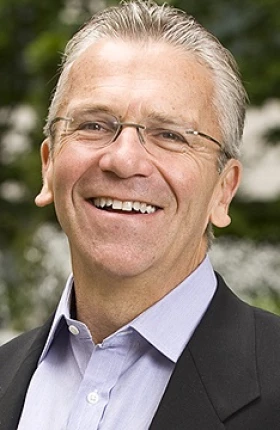This article is the third in a series based on Rocket: Eight Lessons to Secure Infinite Growth, which tells the stories of 16 business leaders who created iconic brands. The book, by Michael Silverstein, Dylan Bolden, Rune Jacobsen, and Rohan Sajdeh, is available now.
Every successful company starts with a dream. This is what drives its founders. But there are far more dreamers than there are apostle companies—those rare and valuable businesses whose fanatical customers follow them, promote them, and propel them to infinite growth. Why is this? It’s because apostle companies are led by people who have not only dared to dream but also dared to act. These entrepreneurs do not know all the answers, but they are not inhibited by fear or a desire to protect the status quo. They are prepared to lose everything for a chance at the big win. When confronted with risk, they bet boldly—they take giant leaps.
In our work with companies around the world, we have encountered many companies that started with next to nothing but their founder’s dreams. After a series of giant leaps—redefining their markets, deeply understanding the latent needs of consumers, and providing highly differentiated products—they have grown into leaders in their markets and created fortunes for their founders and early investors. The founders were not motivated solely by profit or wealth. They were guided by a deep commitment to other people—their customers, of course, but also their employees and suppliers—as they took a series of leaps toward their destination.
In the course of our research for the latest book from The Boston Consulting Group, Rocket: Eight Lessons to Secure Infinite Growth, we looked at two companies that took some successful giant leaps: Mercadona, a Spanish company that began as a butcher shop and now ranks among Europe’s largest, most profitable, and fastest-growing grocery retailers, and Natura Cosméticos, a Brazilian company that now ranks as one of the world’s most profitable cosmetics companies.
Mercadona’s progress got under way when Juan Roig, the company’s main shareholder and chief executive, opted to make a series of bold bets. His major insight was to treat the customer as el jefe—the boss. This is not just another way of saying that the customer is king. From Mercadona’s perspective, the king is a distant figure, whereas the boss is an immediate and commanding presence, with powerful emotions that need to be listened and responded to. Many bosses, as conceived by Mercadona, are female. The name of the business stems from the words for market and woman in the local Spanish dialect of Valencia (the Mediterranean port where the company was founded): merca and dona.
You ignore the boss at your peril. As Roig explained, “Our ‘bosses’…have been the guiding light of the decisions we have taken, because every step has fulfilled our commitment to prescribing the best solution for them to put together their total shopping with the highest quality at the lowest possible price.”
Likewise, Natura Cosméticos has put customers—100 million Brazilian women—at the center of its focus. But one of the company’s great insights was to convert some of these customers into sales consultants. Let’s look at the various giant leaps it took on its way to become one of Brazil’s corporate champions, delivering annual revenues in excess of $3.1 billion.
Great Leap One: The Amazon Laboratory—Use Your Local Resources
Antonio Luiz Seabra founded Natura Cosméticos as a small laboratory and cosmetics shop in São Paulo. The year was 1969. He was 27 years old and full of ambition. His start-up capital was around $7,500. From the beginning, he wanted to use local resources—which just happened to be the Amazon rainforest.
The Amazon encompasses 2.124 million square miles—twice the size of India. It is one of the world’s most miraculous and important natural resources. Scientists call it the “lungs of the planet” because its rich, diverse vegetation recycles carbon dioxide into oxygen. A full 20 percent of Earth’s oxygen is produced by the Amazon’s plant life. Under the forest canopy live half the world’s species. There are 175 types of lizards, 300 types of other reptiles, some 500 different species of mammals, and 1,600 species of birds. Scientists also count 40,000 species of insects, 5,600 different fish, and 16,000 varieties of trees.
Seabra realized that, by using modern science and “medicine man” know-how, he could combine the precious Amazonian ingredients to create products that perfume, moisturize, clean, protect, speed healing from cuts and bruises, and provide antidotes to aging and disease. Today, Natura has more than 700 natural products. It uses 26 native species, 38 exotics, and 56 raw materials from the Amazon.
Great Leap Two: “The Future We Dream Of”—Build Your Business on a Philosophy
Seabra knew that the Amazon is a fragile ecosystem, susceptible to the ravages and intrusions of man. Ambitious logging, farming, and road-building efforts have choked off the Amazon’s abundant food supply, killed wildlife, and altered the balance of nature. The rainforest is shrinking by 1.5 percent per year. Once home to 10 million native Indians, the Amazon now has only 200,000 indigenous people—living in dire poverty but surrounded by resources of almost infinite value.
So as he was launching his business, Seabra vowed to create a values-driven company. He didn’t want to take from the Amazon without giving something back. With his two cofounders, he developed the company’s mission: “Natura’s reason for being is to create and sell products and services that promote ‘well-being’ and ‘being well.’”
This is an approach inspired by Plato. As Seabra has said, “At age 16, I was given this quote from Plato: ‘The one is in the whole; the whole is in the one.’ That was a revelation to me. This notion of being part of a whole has never left me.” And he has expanded on the idea of “well-being, being well” (bem, estar, bem in Portuguese): “Well-being equals the harmonious, pleasant relationship of a person with oneself, with one’s body. Being well equals the emphatic, successful, and gratifying relationship of a person with others, with nature, and with the world.”
To carry out this mission, Natura implements a triple bottom line: (1) economic: cash, growth, and profitability; (2) social: wealth creation for sales consultants, corporate-social-responsibility investment, and benefits to the supplier community; and (3) environmental: carbon neutrality, refillable packaging, sustainable extraction, and extensive use of recycled materials.
To meet its own goals, Natura has committed its resources and its corporate power to the survival of the Amazon. One way it is doing this is by helping the native Amazonians earn higher incomes. It sources the ingredients for its products from 3,000 local families. Its goal is to source 30 percent of its raw materials from 10,000 families in the Amazon.
Natura’s commitment to sustainable development has proved successful with investors and customers. Since it went public in 2004, Natura’s stock has grown 916 percent—four times the BM&F Bovespa index. This goes to show that, as Luciana Hashiba, an executive on Natura’s innovation team, puts it, the company “does not have to make trade-offs between doing good and doing well.”
Great Leap Three: Customers as Sales Consultants—Convert Your Fanatical Followers into Advocates
Natura took its first great leaps when it opted to use the Amazon rainforest as its product laboratory and articulated an advanced set of values. It took its next giant leap by beginning to develop its direct-sales capability.
It is a feature of apostle companies that they turn their most enthusiastic fans into energetic advocates. Natura went a step further. It turned some 1.6 million customers into sales consultants, paying them to sell its products to their friends and family members. With these consultants—formerly stay-at-home moms—the company has been able to successfully pitch a health, beauty, and wellness line of 1,600 items to more than 60 percent of Brazilian households.
The consultants are extremely effective representatives of the company. They forge deep, close relationships with their customers. They know the products intimately, and they know their customers’ hopes and dreams. That’s because they were, originally, just customers. So they understand what it is to have economic constraints and a desire to be beautiful. They can speak about all the technical, functional, and emotional benefits of the product as well as its authenticity. They can describe the product’s origins, why it’s so beneficial, and how it works.
When these consultants encounter skeptics, they use their deep product knowledge and their understanding of the customer. As one of them told us, “Many customers complain that the product is expensive. When this happens, I do not speak as a seller. I speak as a consumer. I say it is more worthwhile to buy a product that costs more and is good than a cheap brand you cannot trust.”
Given the importance of its part-time sales force, Natura is careful to nurture individuals. For full-time staff members, Natura pays well. On average, women get higher salaries than men. The company pays 1.4 times the minimum wage and provides benefits for nursery care, health care, life insurance, and fitness. The average consultant makes $1,100 per year—boosting household income by 25 percent and making a massive difference in the family’s standard of living. Many consultants use Natura as a stepping-stone out of poverty.
Natura benefits from the accumulated “friend lists” and the sweat energy of its sales consultants. The company is now the fourth-largest direct seller in the world. More than 15 percent of its sales are outside Brazil, largely in Argentina, Colombia, Mexico, Chile, and Peru. It now beats Avon, the global titan, in Brazil and other Latin American markets.
Always Look for the Next Great Leap
The great apostle companies never rest on their laurels. Natura’s leaders are now talking about a new growth cycle. They see an opportunity for the company to be innovative in broad categories, connect better to its customers’ needs, and take its values-driven business forward.
But how do you know what the next great leap should be—and when you should take it? Any strategic decision must involve answering some tough questions. Natura’s leaders have their own internal checklist that they use to evaluate their choices:
- Are the company’s investments building the brand?
- Is the company objectively connected to outcomes for the greater good? Is the company’s social purpose fully aligned with its business mission and strategies?
- Is the investment tangible and real and does the market see it: regard, loyalty, price premiums, brand?
- Is the company focused on a key area of social investment and impact—for example, health, education, or nutrition?
- Are there complete and full measures of activity, outcomes, learning?
- Is the CEO personally involved and active in the orchestration?
- Is the level of spending high enough to make a difference?
- Is there internal congruence between the future world, the lives of employees, and the communities in which the company operates?
Not Timid, Not Incremental
No one has ever dramatically changed a market by offering timid, incremental improvements. To win, you need to be demonstrably different and better in all the ways that matter to consumers. Dramatic market-share shifts can happen only when consumers are surprised and excited. It is about glorious differences. You need to be bold.
As you progress, hold these five maxims in your mind:
- “Me too” will not get you where you want to go.
- Richly describe your target consumer.
- Build everything so that the consumer can see it in a snap—be able to integrate your concept and your advantages.
- Never give up trying to evolve and improve. Paradoxically, giant leaps happen only when you’re continuously looking to deliver the unmet and latent needs of consumers on a daily basis.
- Use hard metrics to gauge your progress, test actual versus forecast, and incremental versus cannibalization.







